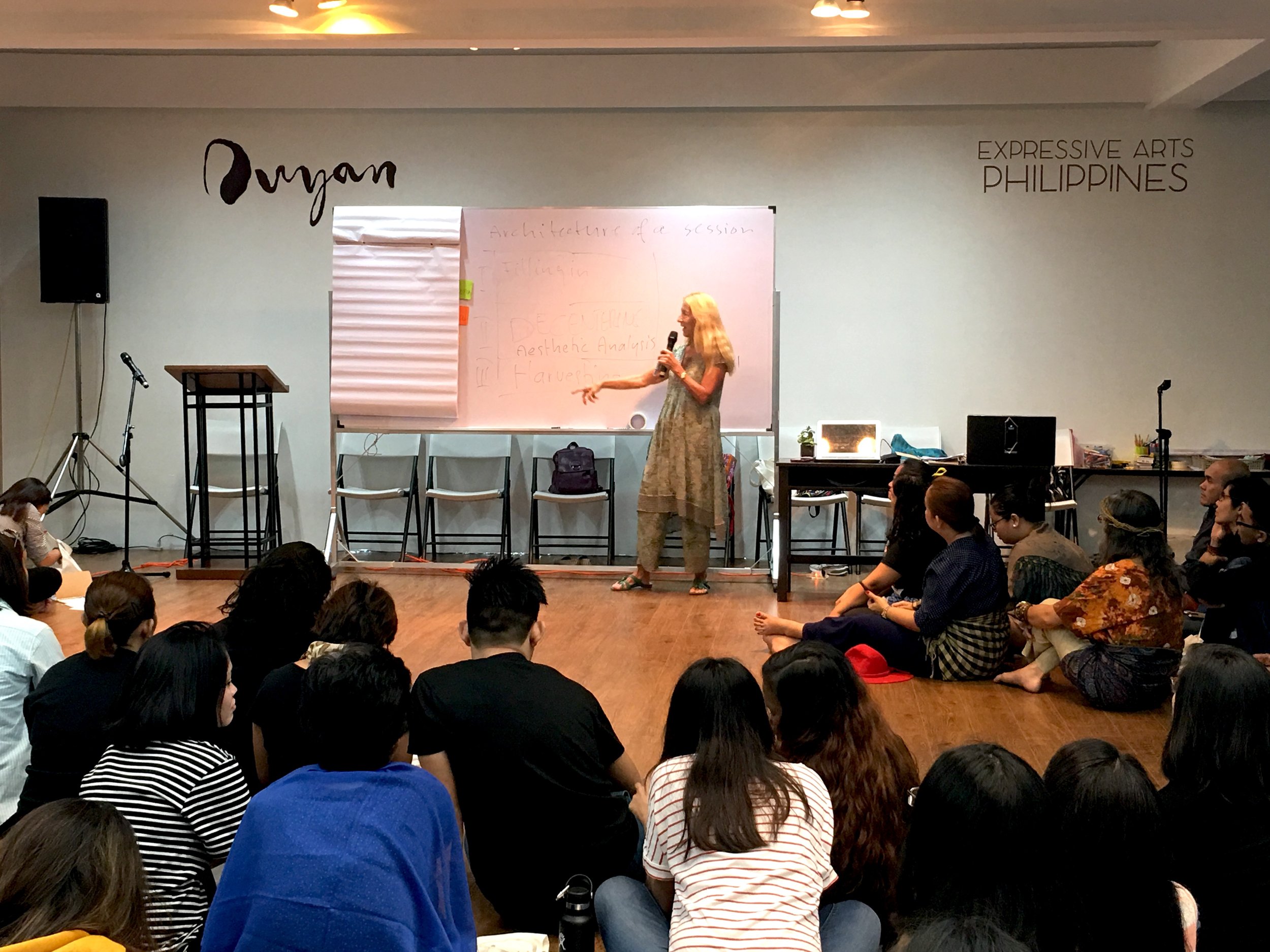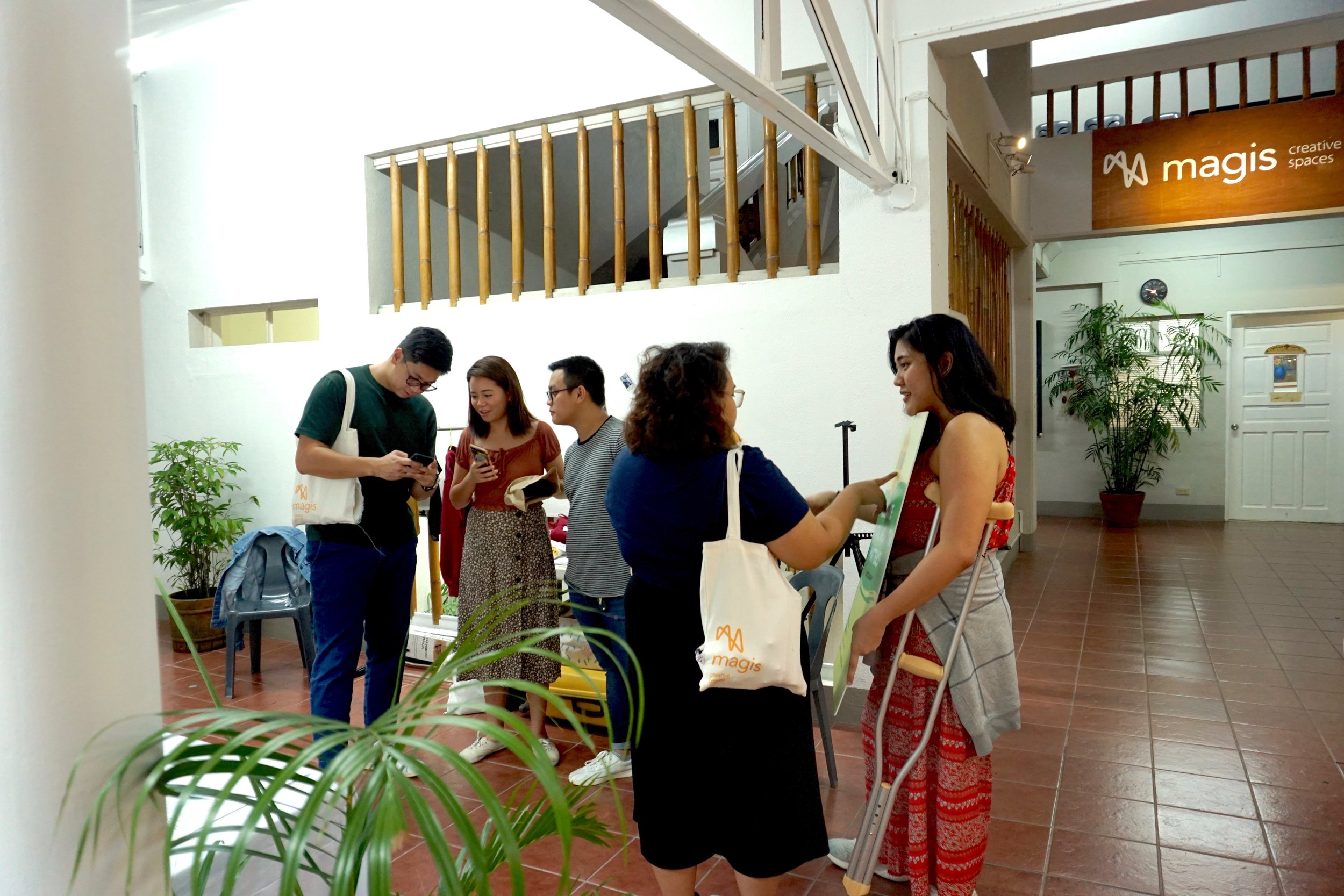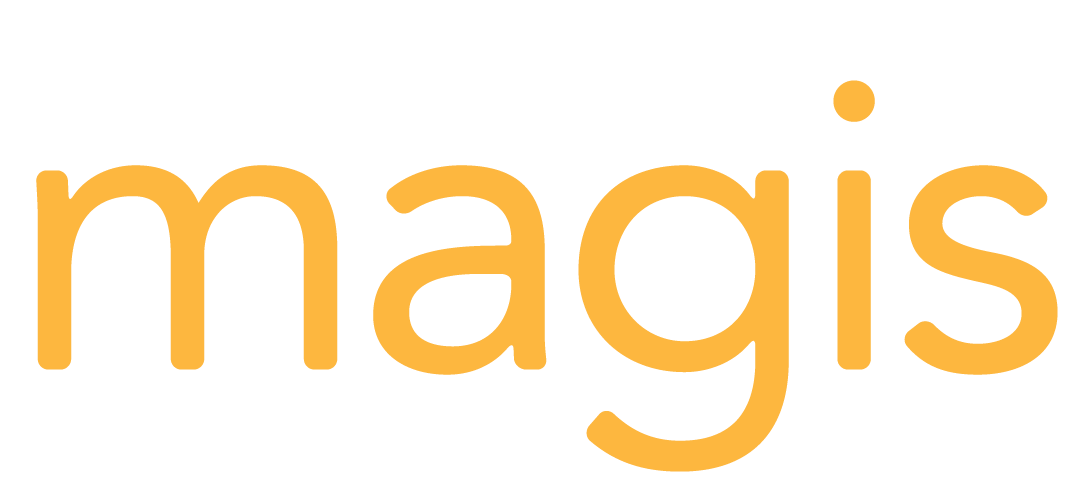CONFERENCE 2019
Duyan
cradling diversity through the expressive arts
November 30 – December 1, 2019
Duyan brought together national and international thought leaders in the arts and healing practices. As a 2-day experiential conference, Duyan for participants was an opportunity to listen, participate, and learn with a community sharing a common advocacy for healing and wellbeing.
-
Duyan was graciously sponsored and supported by ABJ Foundation, Jollibee Group Foundation, South Supermarket, Ceballos Bar Trends, and Brown’s Gourmet.
-
Duyan was generously supported through the advocacy of FAM MNL, Dr. Gia Sison, Bea Policarpio, Tin Berces, ArtVan, On the Third Day Renewal and Formation Center, and Radyo Katipunan 87.9 FM.
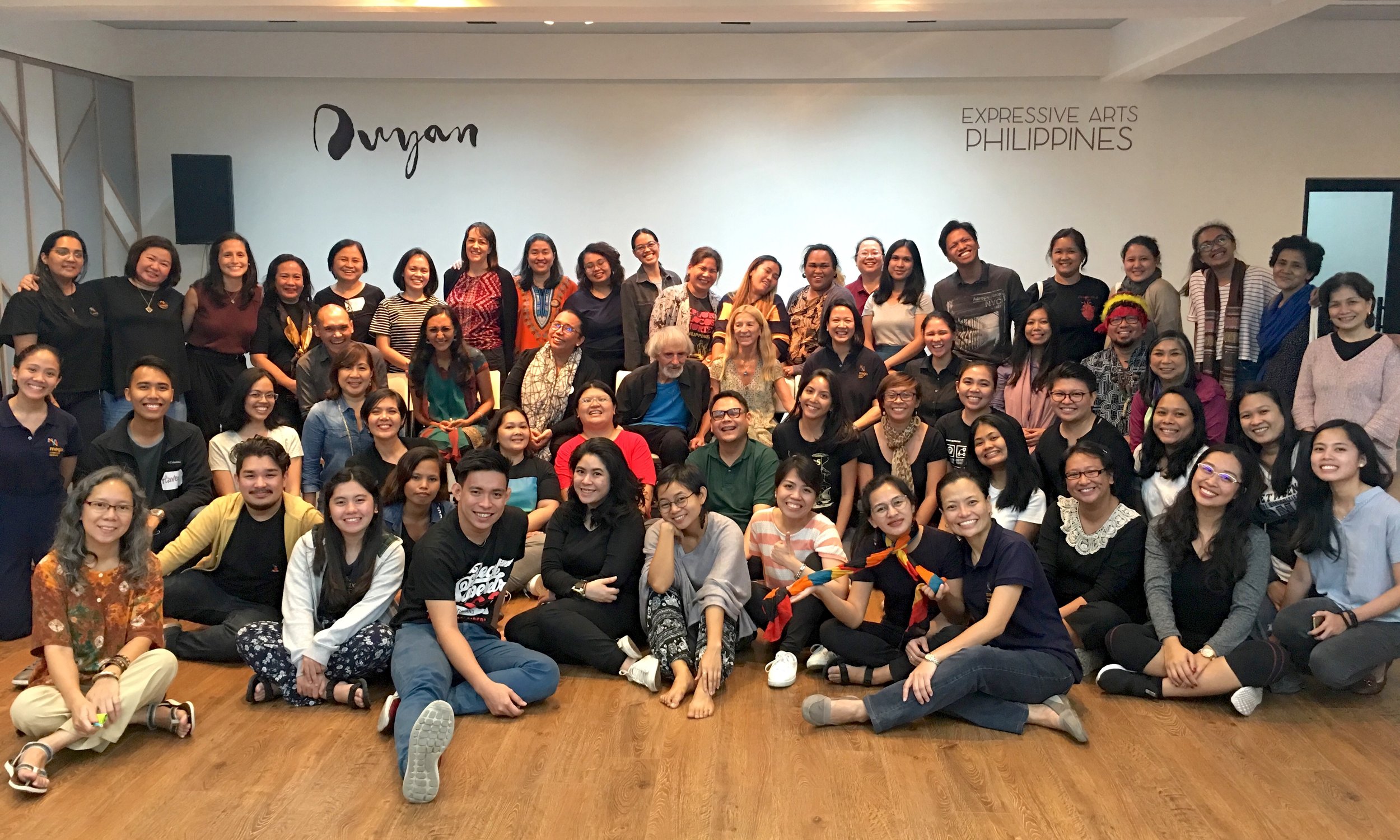
STORIES FROM THE COMMUNITY
It was truly amazing to be part of a group of diverse individuals who share the same passion about healing and helping people through the arts. We are truly grateful for having the opportunity to meet and be in the presence of Expressive Arts Founders, Margo & Paolo Knill, and other prominent EXA practitioners. They truly are an inspiration for us and serve as our motivation to use the arts to help others.
FAM MNL, mental health advocacy group
The poetry activity helped me with my writer’s block. I liked the idea of low-skill-high-sensitivity.
Kevin, filmmaker
Thanks for sharing the journey's and achievements of Krupa, Thelma, and Sarah – these have made me more hopeful for our country.
Yoya, psychologist
It’s relevant to everybody who experiences stress, struggle - basically to all living entities... I’ve been overworked and I have no time to process what I go through. By learning about EXA I got to know more of what I can still do despite not having enough resources.
PJ, development worker
It would be great to bring this to the corporate world, where stress is experienced by most people. Expressive arts could very well help us manage stress in the workplace.
Aseneth, human resources
Paolo’s talks and activities gave me a lot of new insight and I appreciate his wisdom so deeply. It was very relevant to my art practice and to my person. Margo’s liveliness was also very inspiring and all the speakers were so relevant!
Titat, visual artist and instructor
I appreciate the feeling of a safe space, and being connected with everyone attending the event. I appreciated the warm environment that embraced everyone’s input.
Troy, activity therapist
Thank you SO much for organizing Duyan! I’ve been undergoing psychoanalysis for three years now and it has helped me a lot to be centred. Attending the symposium on expressive art therapy w! a huge complement to my therapy. I felt more centred, especially on the aspect of creativity. I’ve been anxious of writing because as a freelance writer, I always need to please my clients. The whole two days provided me a safe space to express whatever my body and soul feel like, and that’s a breather to me!
Amanda, MA student
This is a validation of what I’ve been thinking about in how to solve personal problems and those I help in the educational setting.
Guidance and counseling professional

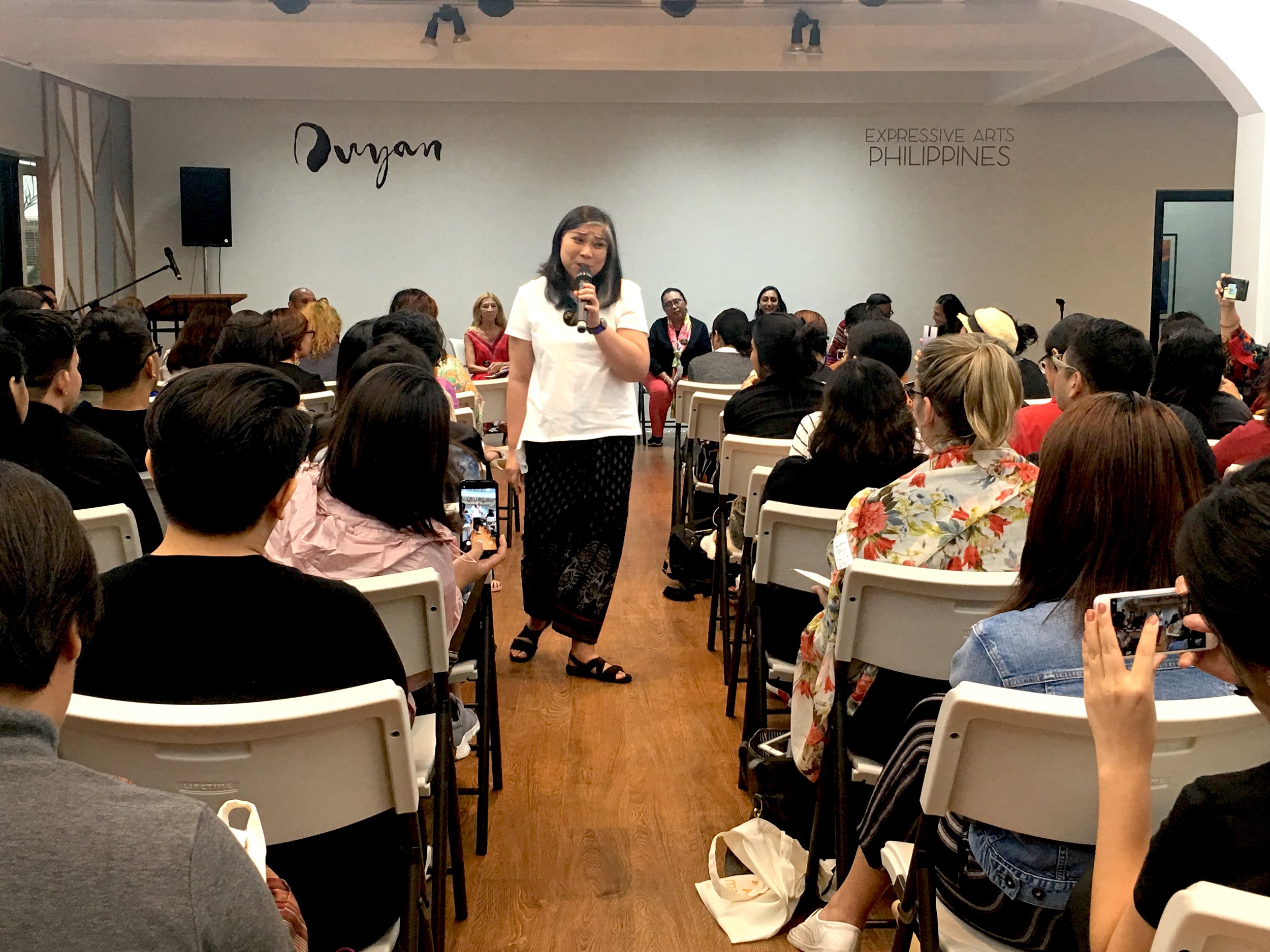

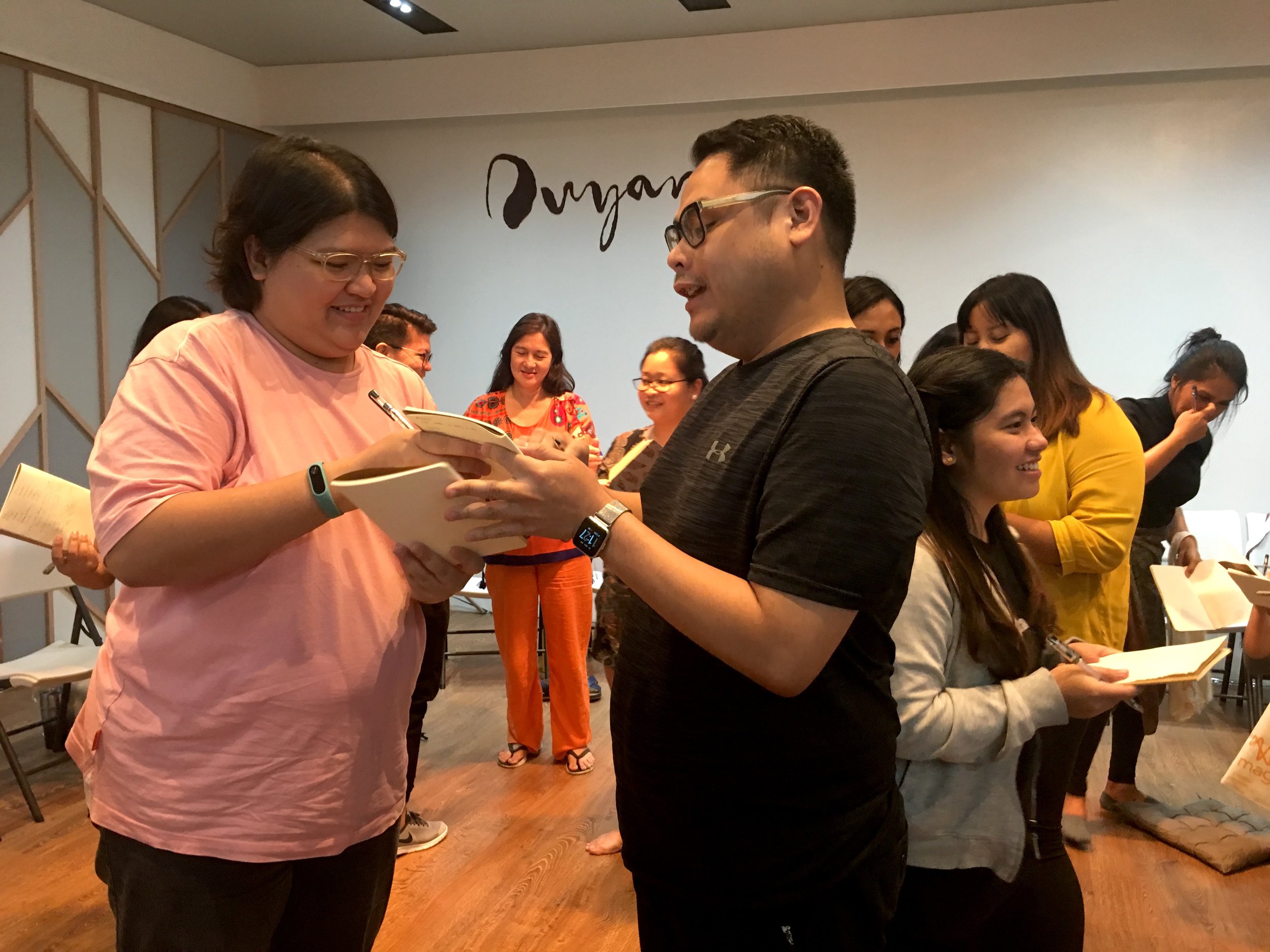
Speakers and Facilitators
-

Paolo J. Knill, PhD
FOUNDING RECTOR, EUROPEAN GRADUATE SCHOOL
PSYCHOTHERAPIST, MUSICIAN, ARTIST -

Margo Fuchs Knill, PhD
DEAN, EUROPEAN GRADUATE SCHOOL
THERAPIST AND MENTAL HEALTH COUNSELOR -

Maria Regina A. Alfonso, PhD, ATR-BC, LCPAT
FOUNDER AND DIRECTOR, MAGIS CREATIVE SPACES
THERAPIST AND EDUCATOR -

Joey Atayde, M.S., R-DMT
MAGIS CREATIVE SPACES
DANCE/MOVEMENT THERAPIST -

Thelma Singson Barrera, RN
NATIONAL CENTER FOR MENTAL HEALTH
PSYCHIATRIC NURSE AND PSYCHOLOGICAL CARE SPECIALIST -

Sarah Queblatin
FOUNDER AND DIRECTOR, GREEN RELEAF INITIATIVE
REGENERATIVE SOLUTIONS DESIGNER -

Marisa Marin, RPsy
MAGIS CREATIVE SPACES
MUSIC THERAPIST -

Krupa Jhaveri, MPS, TIEATC
FOUNDER, SANKALPA ART JOURNEYS
ART THERAPIST, ART DIRECTOR, AND ARTIST -

Amos Manlangit, MAEd
UNIVERSITY OF THE PHILIPPINES
ARTIST, EDUCATOR, AND SPECIAL EDUCATION CONSULTANT -

Fr. Loreto Jaque, CAGS
EXPRESSIVE ARTS FACILITATOR
RATIONALE
Duyan as a safe space in Filipino culture
Duyan connotes a safe space that holds someone for their own expression and discovery of themselves. In Filipino culture, duyan is often associated with calm, relaxation or rest. As an intention for this conference, it describes the encompassing nature of the expressive arts for rest, renewal, and rejuvenation of creativity.
In the foundations of Expressive Arts, the therapeutic nature of the creative process is defined to include imagination, play, and the arts, and co-founder of the approach Paolo J. Knill identifies this as one of humans’ rites of restoration. As part of humans’ rituals of change, rites of restoration acknowledges characteristics of the healing process in human lives. The expressive arts encourage healing in context of suffering, conflict, or crisis, as a “restored cultural binding without necessarily presupposing a complete ‘healing’ of the individual’s distress or condition.” (Knill, 2005) This is to say that the arts can help people into a process of restoration, without pre-empting what the journey and outcome of restoration may look like.
Rites of restoration also acknowledge that suffering, conflict, and crisis can come from one’s “disconnection from fellow humans and the consequent loss of binding within the community.” From a sociological perspective, humans in general have developed ways of living in context of community. Ritual, or these ways of living, can be considered as having three main aspects:
“… an initial period of separation from one’s social group and role, followed by a period in which one is in the ‘margin’ between two different social statuses, concluding with an integration into a new social group with a new identity recognized by all its members.”
van Gennep, 1960, qtd. in Levine, 2005
Community is a key word here, and a word Duyan also intends to anchor on. Filipinos are no strangers to the power of community. From our history to our globally recognized traits of hospitality and pakikisama, our inclination towards community can reflect much about our indigenous roots. This makes for fertile ground for discourse on the intersection of art and healing, as the expressive arts is also an approach based on indigenous practices. Our own indigenous roots are explored in relation to wellbeing in this workshop. How does the Filipino restore cultural binding?
What are the Filipino’s
rites of restoration?
An openness toward a discourse on wellbeing in the Philippines is gradually developing. With the mental health law being passed in 2018, there is growing sensitivity and awareness towards personal wellbeing, and this event is in a prime position to help shape the culture of understanding, acceptance, and responsibility for wellbeing that this country needs. Our modern society makes up one of the most burnt out countries in the Asia Pacific region, with growing suicide rates, high attrition in organizations, and the brain drain phenomenon that sees Filipinos uprooting themselves from their homeland to seek better opportunities in other countries. Our identity as FIlipinos may be described as diasporic, and that does not just apply to those who settle overseas; it applies as well to our modern nature of being in a natural state of comparison to other nationalities, to our unrelenting recovery from colonial mentality.
The Filipino people are a creative people. Our shared history has given our culture the liminality that is needed to give birth to creativity. Liminality is defined as:
a time of confusion and powerlessness, as old identities are abandoned and nothing yet has taken their place; but it is also a time of great creativity, in which one is free to invent new forms of meaning for oneself and for the group to which one belongs.
Levine, 2005
Arguably, it is the chaos of the past that has created the inherent artistry, creativity, and soulfulness in our culture. In the present and future, this gives us potential to harness, material to work with, and hope to bring into whatever challenges arise. While liminality is part of a framework used by expressive arts psychotherapists to process and navigate the therapeutic relationship, through Duyan, we aim to explore how the arts can be a relevant approach in growing a culture of meaning-making and healing in the Filipino community, both on a personal level and on a communal level.
With meaning-making through art, we will find ourselves at an intersection: one with a choice to move towards new perspectives, new understanding, and unity in shaping who we are and what we practice as Filipinos. And that is where we find healing, our own rite of restoration, beginning with the restoration of the culture that cradles us all.




